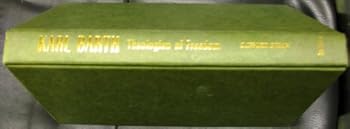Karl Barth: Theologian of Freedom
Select Format
Select Condition 
Book Overview
Ranked by many among the great theologians of church history, Karl Barth was the leading European theologian in the first half of this century. His 1919 Romans signaled the end of the nineteenth... This description may be from another edition of this product.
Format:Hardcover
Language:English
ISBN:0005991293
ISBN13:9780005991299
Release Date:March 1989
Publisher:Collins
Length:348 Pages
Weight:1.06 lbs.
Customer Reviews
2 ratings
Theologian of Freedom
Published by Thriftbooks.com User , 20 years ago
This volume on the works of Karl Barth is part of a series by Fortress Press entitled 'the Making of Modern Theology: Nineteenth and Twentieth Century Texts'. Each of the volumes in the series focuses upon one particular theologian of note. These volumes are of use to students, seminarians, ministers and other readers interested in the development of theological ideas in the modern and postmodern world. Each volume is a reader of key texts from the theologian highlighted - the text entries are annotated a bit by the editors, and the editor of each volume provides an introduction setting the general stage for context and understanding.Editor Clifford Green describes Barth as a theologian of freedom. Freedom is not here characterised in the Western political sense, but rather in a theological sense -- God frees us from sin and death and frees us for new life. Barth, born near the end of the nineteenth century, had a strong reaction to biblical and theological scholarship during that time, which was increasingly becoming an amalgamation of history, philosophy, culture and linguistic studies, but very little substantive work was done (or even felt necessary for) faith and belief. Educated in the liberal theological tradition of Germany, then the dominant voice in Christian theological enterprise, he studied with leading scholars such as Schleiermacher and van Harnack. At first intending to have an academic career, he left this for a time to take a pastorate in Geneva. His liberalism took hold in the form of socialist activity - he helped to organise trades unions, and began preaching and lecturing on social gospel and social justice issues. Barth was disillusioned by the theological establishment's support of Germany in the first world war (and its support of war in general), and turned his back on this establishment in many ways, not the least of which was intellectually. He began work on his life's magnum opus, the multi-volume Church Dogmatics, as well as other works that would be pivotal in theological development. One such text was his commentary on the book of Romans.In this commentary, Barth broke with the prevailing theological notions of analysing the text for understanding of various aspects -- historical, linguistic, etc. -- and instead used these various methods of interpretation to look at the book of Romans as the Word of God. It also argued a renewed sense of God that is beyond human notions of religiosity -- a recurrent theme in the liberal theological development. This God, however, would become for Barth 'wholly other', a God in no way dependent upon humanity or humankind's actions. However, this would eventually become too great a chasm for Barth; that God is wholly other remains a constant, but God becomes through Barth's development of Christology and incarnation a God who is wholly other with us. Green's selection of texts comes in five sections. The first gives a few pieces by way of introduction, including exc
An accessible Barth
Published by Thriftbooks.com User , 23 years ago
Clifford Greeen's introductory essay and comments on the selected texts set Barth in his historical context, chart the development of his thought, and indicate the significance of his theology in the development of Christian theology as a whole. Extensive coverage is also given to Barth's public theology, including such topics as civil community, communism, and nuclear war. It is an excellent introduction to a theologian whose vision is arguably broader than anyone since Aquinas.






